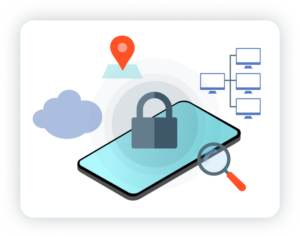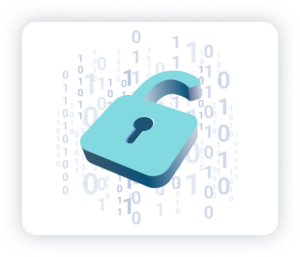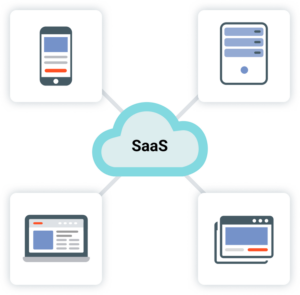Digital transformation and cloud adoption hold huge potential for capital providers and financial institutions. And yet, many MCA funders are hesitant to take the leap because it comes with “security risks” … or so they think.
Yes, cloud data breaches do happen, and they are expensive. But they’re becoming more of an anomaly, and cloud services have been safer than keeping data on-site for a long time now. Decision-makers need to know just how far the technology and regulations backing the SaaS model of funding have progressed.
This article will look at some of the biggest misconceptions surrounding SaaS security, and show where there are myths and preconceived notions.
5 Benefits of SaaS for MCA Funders
Before we jump into busting myths, let’s briefly bring to mind the benefits that SaaS brings to your MCA funding business.
- Flexibility: SaaS being a payment subscription model, you only pay for the infrastructure and services for the time you use it.
- Agility: Adapt your processes in a heartbeat, based on customer feedback and your own needs.
- Analytics: A SaaS platform collates data more intuitively and offers data reporting and analytics features.
- Integration: APIs make SaaS software a versatile addition to your funding business, one capable of integrating with virtually every other SaaS software so you can expand your service offering to clients and easily integrate internal workflows.
- Scalability: Scaling on-premises physical servers could take months and is a monumental expense. SaaS providers already have the infrastructure to help you scale in a fraction of the time with minimal to no cost.
With its clear advantages, are you still hesitant to adopt SaaS for your MCA funding business? If you have SaaS security concerns, you might still be holding on to the following (surely outdated) beliefs.
Myth #1: SaaS Funding Platforms Aren’t Regulatory Compliant

Failure to comply with the laws that regulate funding activity and the use of data could result in huge fines and damage to your reputation. These regulations are in place to protect the interests of your merchants, and your merchant’s best interest is your best interest too.
Ever since the pandemic, the funding regulatory environment has been evolving at a rapid pace. Keeping up with, reviewing, and implementing these regulatory changes can be cumbersome for your MCA funding business, and take precious resources from your main business activities.
Cloud service providers are required by law to meet many international regulatory guidelines (e.g., PCI DSS, ISO 27001, HIPAA, SOX, NERC, GDPR, etc.) even to begin working with funders or small business lenders. Most providers pride themselves on keeping on top of compliance requirements, maintaining the highest standard of security while also anticipating regulatory changes that are likely to come.
When dealing with stakeholders in multiple countries, complying with regulations becomes even more critical and challenging. The biggest cloud service providers–like Microsoft, Google, and Amazon–interact with regulatory bodies in many countries around the world to ensure that their cloud services are internationally compliant.
SaaS is not only as compliant as software can get, but it can also ease the regulatory burden of funders, as updates are automatically rolled out by the provider, in order to adhere to the latest regulatory standards. In fact, many Tier 1 banks have turned to cloud for most if not all of their software needs (not just lending/funding management), including payments processing, human resource management, app development, and even core banking.
Myth #2: SaaS Funding Platforms Can’t Secure Data

Lately, some infamous data breaches on cloud platforms have caused concern among businesses considering cloud adoption. But the reality is that SaaS platforms that use the cloud to store data are more secure than storing data on-premises.
Securing data locally is a mammoth task for any IT department.
They have to manually review and update security and patch updates to internal servers, constantly monitor servers for unauthorized access, and create firewalls to protect internal and external networks from malware. Each update is thoroughly assessed in a testing environment before it’s rolled out, potentially taking weeks or months while leaving local servers vulnerable.
Cloud service providers invest extensively in security and hire top cybersecurity experts to update tools and procedures. When you choose a cloud service provider that prioritizes data security, the security and patch updates are administered for you. You get various levels of data monitoring by both the cloud application provider and the data host. Cloud service providers can also firewall your networks with greater frequency, which adds more layers of security.
On-premises data is also vulnerable to any potential damage to physical infrastructure. A single hit to your data centers, and you could lose all of your data, leaving you with no business and a damaged reputation. With cloud storage, your data is immune to any physical impacts.
With a DevSecOps operating model, cybersecurity specialists, and robust security controls, SaaS funding platforms can become much more secure than storing data on-premises.
If you’re curious about cybersecurity in the context of MCA funding, read our blog post on the subject.
Myth #3: SaaS Funding Platforms Are Too New to Fully Trust

SaaS has actually been around for much longer than you think!
You may be familiar with the story of Salesforce inaugurating the SaaS movement with its CRM platform in 1999. But the foundations for SaaS were set way back in the 1960s.
In most cases, SaaS programs are available for a monthly subscription fee, where you get ahold of the software for the period you desire. The time-sharing aspect of SaaS applications was established by the compatible time-sharing system developed at MIT in 1961.
As businesses started implementing on-premises computing in the following decades, IT departments were overburdened by software installations, security, monitoring, and maintenance. This made (and still does!) it time and resource-consuming to scale.
The development of cloud computing made it possible for software to be downloaded on remote servers through the internet. Over time, this became cheaper and more efficient, evolving into the SaaS model we all know today.
The SaaS model has been through several iterations and decades of development. The same can be said of SaaS funding platforms. Although the SaaS model has permeated more slowly into the MCA industry, most of its functions have been adapted and improved from the original versions of SaaS.
What Does a Safe and Secure SaaS Funding Platform Look Like?
Success as an MCA funder in the digital age is all about choosing the right software for your funding business. Some are simply not rigorous enough when it comes to data security—no wonder SaaS platforms get a bad rap about being insecure!
If you’re in the market for SaaS funding software to gear up and scale your MCA business, then look out for the following essential features, which make a platform safe and secure:
- SOC 1 or 2 certifications: Service Organization Control (SOC) reports certify that organizations have internal financial reporting controls, ensuring that your data is in safe hands. If not wholly certified, ensure the certification process has at least been started. Note: Onyx IQ has achieved SOC 2 Type II compliance.
- SSO and multi-factor authentication: requesting two or more pieces of identity information is the industry standard in the digital age. However, SSO (single sign-on) is more user-friendly as the user only has to remember one password to log into multiple applications. Both SSO and multi-factor authentication are secure—look for a platform with both capabilities.
- Ability to whitelist/blacklist IP addresses: as the first step to protect you against hackers, a secure SaaS funding platform should be able to let you filter out illegitimate and malicious IP addresses.
- Work with PCI-compliant payment processors: Payment Card Industry Data Security Standard (PCI DSS) is the top information security standard for organizations handling credit and debit cards from the major card scheme. Organizations are not required by law to adhere to PCI DSS, so if you find one that does, you know that they prioritize security. Find the 12 PCI DSS requirements here.
- Information security policies: these internal policies help govern SaaS and give clear instructions on what each stakeholder must do to regain integrity, control damage, and get back to business as usual if an information security breach occurs.
If you’ve found a SaaS platform that meets all these criteria, then you’ve truly discovered a platform that not only prioritizes security but also hinges its reputation on being a reliable platform.
The Power of Consistent Uptime
Stating that your systems should be up 99.9% of the time might seem an obvious fact. Still, the harsh reality is that systems do go down unexpectedly (and for significant periods of time).
Even minor outages can add up to substantial costs. A study by the Ponemon institute in 2013 found that data center outages can cost companies more than $7,900 per minute. In 2024, this figure will be considerably higher.
Some of the direct costs of downtime are lost revenue (as you’re unable to process new deals), lost wages, and remedial labor costs (as your employees’ workflow is interrupted). Even government fees can rack up as you fail to fulfill service-level agreements.
The same report found that indirect costs of downtime can also be costly for your business in the long run, as your customers will trust you less. After losing your reputation in the industry, some of your existing clients might switch to a competitor, and prospective clients may turn away even before starting to do business with you.
Even employees can become demotivated, frustrated, and less productive when they cannot fulfill their roles within the business because their tools are failing them.
Onyx IQ: Opt For Reliable and Secure MCA Funding Software
Digital Transformation is driving MCA funding and cloud adoption is an integral part of this overhaul.
At Onyx IQ, we believe in the potential of the cloud to transform MCA funding. We take special pride in ticking all the boxes when it comes to SaaS security. With Onyx IQ, we help you stay compliant, keep your data safe with our cloud SaaS funding platform, and prioritize system uptime.
Are you interested in learning more about SaaS MCA funding? Check out the Onyx IQ website, or sign up for a demo of our software to learn more about how we keep your data secure.

